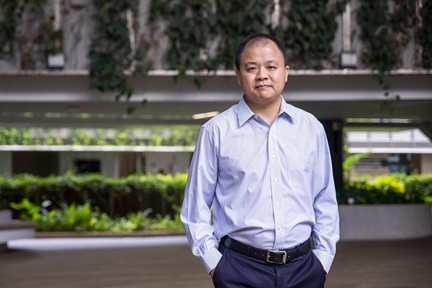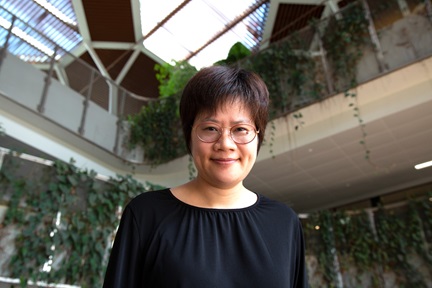Robots on the horizon
Manufacturing and robotics technologies developed by research centres and corporate laboratories at NTU will dramatically change how we lead our lives.

Imagine a regular day ten years from now. You wake up in a 3D printed apartment, and while brushing your teeth, a robot housekeeper prepares your breakfast and vacuums the floor. At work, you order lunch from a restaurant across the street, which is delivered to your desk by an autonomous food delivery robot that has crossed the road and taken the lift to your office.
These innovations and more are examples of what is possible when academia and industry collaborate to bring research from the laboratory to the real world. Here, we explore how four research centres and corporate laboratories in NTU are revolutionising manufacturing and autonomous technologies together with their industry partners to make this future a reality.
3D printing in manufacturing
times as it enables manufacturers to directly transform their designs into actual products.
Aiming to take advantage of this growth, the Singapore Centre for 3D Printing (SC3DP) collaborates with industry partners to conduct research in key industry areas, from aerospace and defence to building and construction, marine and offshore, future of manufacturing, bioprinting and food and electronics. The Centre is funded by Singapore’s National Research Foundation and supported by the Economic Development Board and companies.
Research projects at SC3DP include a tie-up with medical device manufacturers to 3D print biomedical implants, as well as 3D printing bathroom units using patented liquid concrete in a collaboration with construction conglomerate Chip Eng Seng Corporation Ltd (read more about construction 3D printing on page 32).
“With increasing worldwide interest and attention in 3D printing, our industry partnerships enable us to capitalise on the current strengths of the technology and intensify efforts to enhance Singapore’s competitive edge in the manufacturing industry as well as to respond to global challenges,” says Prof Timothy White, NTU’s Associate Vice President (Infrastructure & Programmes), who chairs SC3DP’s Governing Board.
3D printing is also the focus of the HP-NTU Digital Manufacturing Corporate Laboratory. Launched in November 2018 as a collaboration between HP Inc., NTU and Singapore’s National Research Foundation, it aims to advance 3D printing around artificial intelligence, machine learning, new materials, cybersecurity and customisation applications.
Using HP’s multi-jet fusion technology, 3D objects can be constructed a single unit at a time, like building a structure from micro-sized Lego bricks. This enables highly detailed and complex structures to be manufactured.
“3D printing also fosters the creation of supply chains that are resilient to disruptions since goods can be manufactured just in time for distribution. It will be the future of manufacturing, together with other digital technologies. We foresee that 3D printing, already a growing pie over the last five years, will dominate manufacturing in the next decade,” says the Lab’s Director, Prof Tan Ming Jen of NTU’s School of Mechanical and Aerospace Engineering.
Automation for smart cities
From robotic dogs to humanoid assistants, robots and autonomous technology are becoming a reality in daily life. Such innovations are an integral part of smart cities, where they are used to manage the assets, resources and services of urban areas efficiently.
The Continental-NTU Corporate Laboratory, another corporate lab supported by Singapore’s National Research Foundation, was launched with leading German automotive company Continental in April 2021 to leverage autonomous technologies that fuel the growth of smart, green and liveable cities. The Laboratory has identified 16 industry-focused projects in the areas of smart mobility and delivery, artificial intelligence and software engineering, and smart materials and communication technologies.
Working with Singapore’s Land Transport Authority and JTC Corporation, the Lab will be using Continental’s autonomous robot, Corriere, to explore last-mile deliveries. The robot can safely navigate paths, cross roads, clear building security turnstiles, and take the lift on its own.
“To realise the vision of a smart city, academia, industry and government agencies have to work together. Keeping this in mind, the Continental-NTU Corporate Lab provides a fertile platform for such collaborations to take place,” says the Lab’s Co-Director, Prof Guan Yong Liang of NTU’s School of Electrical and Electronic Engineering.
is developing collaborative robotics and autonomous systems for the logistics, manufacturing and healthcare sectors.
Launched in March 2021, CARTIN is a partnership with the National University of Singapore and Singapore’s Agency for Science, Technology and Research. In the works are autonomous vehicles that transport goods in shipping ports, robots that help human workers in factories manipulate and assemble parts, as well as robotic assistants designed to care for the elderly.
“We aim to develop game-changing, affordable, safe and user-friendly robotics technologies that can greatly impact industry and society. Working closely with our industry partners helps to ensure a seamless deployment of these technologies to society,” says Prof Xie Lihua of NTU’s School of Electrical and Electronic Engineering, the Centre’s Director.
Positioned uniquely between academia and industry, these four hubs of innovation are poised to shape the landscape of manufacturing and robotic technologies in the years to come.
The article appeared first in NTU's research & innovation magazine Pushing Frontiers (issue #19, August 2021).














/enri-thumbnails/careeropportunities1f0caf1c-a12d-479c-be7c-3c04e085c617.tmb-mega-menu.jpg?Culture=en&sfvrsn=d7261e3b_1)

/cradle-thumbnails/research-capabilities1516d0ba63aa44f0b4ee77a8c05263b2.tmb-mega-menu.jpg?Culture=en&sfvrsn=1bc94f8_1)

7e6fdc03-9018-4d08-9a98-8a21acbc37ba.tmb-mega-menu.jpg?Culture=en&sfvrsn=7deaf618_1)






